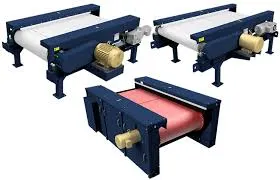

ਦਸੰ. . 06, 2024 17:33 Back to list
The Importance of Industrial Waste Shredders in Modern Manufacturing
In the contemporary world, industrial waste management has become a pressing concern for manufacturers across various sectors. As industries evolve and expand, the volume and complexity of waste generated has increased, making effective waste management strategies paramount. One of the most vital components in this waste management hierarchy is the industrial waste shredder. This powerful piece of machinery plays a crucial role in minimizing waste volume, enabling recycling, and ensuring environmental sustainability.
At its core, an industrial waste shredder is designed to reduce large volumes of waste into smaller, more manageable pieces. The shredding process involves the mechanical breakdown of materials such as plastics, metals, wood, and electronic components. By size-reducing these materials, industrial shredders facilitate easier handling, transportation, and processing, thereby streamlining the overall waste management process. Additionally, smaller waste sizes can enhance the efficiency of subsequent recycling operations, allowing more materials to be recovered and reused.
The necessity of shredding industrial waste stems from the diverse types of waste generated in manufacturing settings. From obsolete machinery to defective products and packaging materials, dealing with a mishmash of waste types can be daunting for companies. Shredders offer a versatile and efficient solution, accommodating a wide variety of materials. Various shredder designs, including single-shaft, four-shaft, and dual-shaft shredders, cater to different waste types and shredding requirements. Selecting the appropriate shredder based on the specific waste characteristics can optimize the process, resulting in greater operational efficiency.
One of the primary benefits of using an industrial waste shredder is its contribution to environmental sustainability. By reducing waste volume, shredders allow for more efficient use of landfill space. Landfills are fast becoming overwhelmed across many regions, leading to increased costs and environmental impacts. Effective shredding can significantly decrease the amount of waste sent to landfills, thus prolonging their life and reducing the negative environmental effects associated with waste accumulation. Moreover, by facilitating recycling, shredded materials can be repurposed into new products, thereby conserving natural resources and energy.

Cost savings are another compelling reason for the adoption of industrial waste shredders. When waste materials are appropriately reduced in size, they require less space for storage and transport, leading to decreased logistical costs. For businesses that generate significant quantities of waste, this can translate into substantial savings over time. In addition, many companies have discovered that recycling shredded materials can generate additional revenue. By selling recovered materials to recycling facilities or other manufacturers, businesses can turn waste into a new source of income.
Furthermore, safety is a critical aspect of industrial operations that shredders can help address. Large, bulky waste materials can pose a safety hazard to workers if not adequately managed. Shredding such materials reduces the risk of accidents and injuries in the workplace. This is especially relevant in manufacturing plants where employees are regularly interacting with heavy machinery and large waste items. By implementing a shredding system, companies can enhance safety protocols while also promoting a cleaner work environment.
Despite these advantages, it is vital for businesses to consider the maintenance and operational aspects of industrial waste shredders. Regular maintenance is essential to ensure optimal performance and longevity of the equipment. Companies should also invest in training staff to operate shredders safely and effectively. By doing so, organizations can maximize the benefits of shredding technology while minimizing potential risks.
In conclusion, industrial waste shredders are indispensable tools in the manufacturing sector, offering a myriad of benefits ranging from waste volume reduction to enhanced recycling capabilities. In an age where sustainability is more critical than ever, investing in efficient waste management solutions like shredders is not just a choice but a necessity for forward-thinking businesses. By embracing industrial shredding technology, manufacturers can significantly improve their waste management practices, reduce operating costs, promote safety, and minimize environmental impact. As industries move toward a more sustainable future, the role of industrial waste shredders will undoubtedly continue to grow.
Latest news
Troubleshooting Common Eddy Separator Problems
NewsJul.04,2025
The Role of Metal Recycling Plants in Circular Economy
NewsJul.04,2025
The Impact of Recycling Line Pickers on Waste Management Costs
NewsJul.04,2025
Safety Features Every Metal Shredder Should Have
NewsJul.04,2025
How Industrial Shredders Improve Waste Management Systems
NewsJul.04,2025
How Cable Granulators Contribute to Sustainable Recycling
NewsJul.04,2025